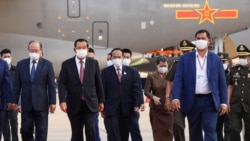The Cambodian government has deported a Chinese journalist for publishing what authorities deemed “fake news” about a purported scheme offering COVID-19 vaccines for a “service fee.”
Shen Kaidong, 52, the editor of Angkor Today since 2015, was deported last week after posting a February 23 story about Chinese nationals in Cambodia receiving anonymous text messages offering a COVID-19 vaccine for $120. Angkor Today, previously named the Angkor Times, publishes news stories on Facebook and WeChat, the popular Chinese social media platform.
Police arrested Shen Kaidong on February 24 in Siem Reap province, best known for the Angkor Wat temple complex.
Shen Kaidong’s story came at a time of increased Cambodian government sensitivity about the efficacy of the Chinese-made Sinopharm COVID-19 vaccine, which is currently being given to frontline workers. A former opposition party official and a party supporter were arrested last week for posting comments about the Chinese vaccine on social media.
Cambodian law enforcement officers and Health Ministry officials denied the Angkor Today allegations that doses of the Sinopharm were for sale but did not provide any details of an investigation into the claim. Immigration officials used a new directive that allows the government to deport foreign nationals and ban their re-entry for spreading “fake news” about COVID-19.
Rights groups and press freedom advocates have been critical of the government’s alacrity to use the Criminal Code against journalists and publications, rather than the Law on the Press, which allows publications to issue corrections if they publish inaccurate information.
Ith Sothoeuth, media director at the Cambodian Center for Independent Media, called for “a thorough investigation into whether the vaccine is being sold or not.”
“This can provide justice to other journalists,” he said.
The government announcement of Shen Kaidong’s deportation and ban did not provide any details as to why he was deported or whether claims of his story were investigated.
Keo Vanthan, a spokesperson for Cambodia’s General Department of Immigration, said Shen Kaidong was put on a plane for publishing fake news but did not provide any other details surrounding the case.
“He published fake news and it caused social chaos,” Keo Vanthan said.
The Information Ministry revoked the license for Angkor Today on February 25 and the Health Ministry denied any vaccines were for sale in the country.
“We do not charge people money for COVID-19 vaccines,” said Or Vandine, a spokesperson for the Health Ministry, according to the Phnom Penh Post. “All vaccinations are voluntary and do not cost anything.”
An English translation from Angkor Today’s WeChat account found the initial article reported that several Chinese nationals received a text message promising them the Sinopharm COVID-19 vaccine for $120. The Chinese-language news outlet provided screenshots of these messages.
Reporting on the offer, an Angkor Today reporter called a phone number listed in the texts and the person who answered said the $120 was not for the vaccine but for a shuttle service to Phnom Penh, where the vaccine was available.
The story posted on Facebook says that once a vaccine appointment is set, “a car will be sent to pick up the person. The vaccination time is around the 30th of this month.”
Even though there are only 28 days in February, the phone interviewee quoted in Shen Kaidong's story did say the "30th of this month."
The story also includes comments from Chinese nationals questioning the scheme as a potential scam. The story ends by promising additional reports on the text messages.
The Chinese Embassy in Phnom Penh on February 24 issued a statement on WeChat, according to the Angkor Today acknowledging that some Chinese nationals had received a text promising the COVID-19 vaccine for “a service fee” of $120, adding that it had seen reports of other social media posts offering the vaccine for as much as $450.
The Chinese embassy reminded its citizens that the vaccine was not for sale, cautioned them about scams, and said to follow Cambodian government procedures for getting the vaccine.
Kim Santepheap, a secretary of state at the Justice Ministry who spoke at a February 19 press conference announcing the “fake news” deportation directive, said publishing or sharing of “fake news” about the pandemic could also carry a criminal charge.
Cambodia has jailed dozens of people since the start of the COVID-19 pandemic for critiquing the government’s response to the outbreak. Last year, at least two dozen people linked to the dissolved Cambodia National Rescue Party (CNRP) were arrested, detained or imprisoned for posting critical comments on Facebook, talking about the pandemic.









